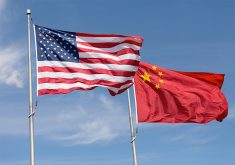BEIJING (Reuters) — China should limit annual grains imports to 11 million tonnes until the government can reduce its massive state reserves, Qian Kemin, chief economist at the country’s Ministry of Agriculture said on Monday.
Government leaders have repeatedly said Beijing would control grains imports to try to cut oversupply because record stockpiles are leading to storage problems.
Annual imports of 11 million tonnes would be 43 percent lower than imports last year.
China, the world’s second largest corn consumer, is likely to add a record volume of corn to its inventories this year, with state stocks accounting for more than half of the country’s annual consumption.
Read Also

B.C. ostriches now to be culled after ruling: CFIA
Birds are now to be culled from a British Columbia ostrich operation that sought to bypass standard federal practice in on-farm outbreaks of highly pathogenic avian influenza and has been denied an appeal at Canada’s highest court.
The country imported 19.3 million tonnes of grains in 2014, with import growth largely driven by sorghum, where imports rose 439 percent on year to a record 5.77 million tonnes.
Longer term, China should be more open to imports, given that domestic annual total grains output is to be capped at 610 million tonnes in the coming five years, Qian said via an official web site.
“We should no longer seek a bumper harvest for the 12th consecutive year or the 20th year,” said Qian, who is also a member of the Chinese People’s Political Consultative Conference, an advisory body to the country’s parliament. He said a shortfall (above 610 million tonnes) could be met with imports.
China’s grain harvest grew for the 11th year in a row last year, but the harvest was achieved at a heavy environmental cost. China’s use of fertilizer accounts for 35 percent of total global consumption, while underground water was severely overexploited, Qian said.
Qian estimated the country’s consumption of total grains, including soybeans, at about 720 million tonnes in 2020. China, the world’s top soybean buyer, imported 71 million tonnes in 2014.














